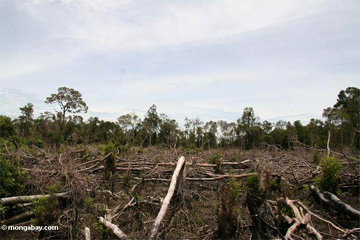With deforestation increasingly driven by industrial actors, rather than subsistence farmers, tropical timber managers should be aware of the growing clout of environmental groups in swaying public opinion, says a forest expert from the Smithsonian Tropical Research Institute, writing in the International Tropical Timber Organization’s July Tropical Forest Update.
“The tropical timber industry can expect an increasingly hard line from environmental groups and consumers, as part of a broader effort to combat the growing impacts on forests of industrialization and globalization,” writes William F. Laurance. “Although many in the tropical timber industry believe a ‘use it or lose it’ approach is the best way to promote natural forest maintenance, the industry is one of the most conspicuous—and therefore vulnerable—exploiters of forests.
|
|
In recent years, members of the industry have teamed with environmental groups on initiatives like the Forest Stewardship Council, a certification scheme that aims to improve the sustainability of logging operations. But activists have been increasingly questioning the credibility of FSC follow a series of scandals suggesting that in some cases it has failed to ensure responsible timber harvesting. Laurance says that the industry needs to make a serious commitment to sustainability if it wants to avoid criticism.
“Unless it moves aggressively toward effective self-policing, it will increasingly find itself the target of adverse actions and publicity. The smart tack under such circumstances is to take environmental sustainability very seriously. It is simply good business.”
Laurance’s paper is available in PDF form at Changing realities for tropical forest managers
Related articles
Fallout from Greenpeace report deepens in Brazil
(07/01/2009) Responding to allegations that major Brazilian cattle producers are responsible for illegal forest clearing in the Amazon, Brazil’s development bank BNDES will soon require processors to trace the origin of beef back to the ranch where it was produced in order to qualify for loans, reports Brazil’s Agencia Estado. The traceability program aims to ensure that cattle products do not come from illegally deforested land.
Shift from poverty-driven to industry-driven deforestation may help conservation
(08/06/2008) A shift from poverty-driven deforestation to industry-driven deforestation in the tropics may offer new opportunities for forest conservation, argues a new paper published in the journal Trends in Evolution & Ecology. Citing research showing a transition in the forces driving tropical forest destruction, Rhett A, Butler of mongabay.com, a tropical forest web site, and William F. Laurance of the Smithsonian Tropical Research Institute in Panama suggest that the “industrialization” of deforestation provides environmental lobby groups with identifiable targets that may be more responsive to pressure on environmental concerns than tens of millions of impoverished rural farmers.
Corporations become prime driver of deforestation, providing clear target for environmentalists
(08/05/2008) The major drivers of tropical deforestation have changed in recent decades. According to a forthcoming article, deforestation has shifted from poverty-driven subsistence farming to major corporations razing forests for large-scale projects in mining, logging, oil and gas development, and agriculture. While this change makes many scientists and conservationists uneasy, it may allow for more effective action against deforestation. Rhett A. Butler of Mongabay.com, a leading environmental science website focusing on tropical forests, and William F. Laurance of the Smithsonian Tropical Research Institute in Panama believe that the shift to deforestation by large corporations gives environmentalists and concerned governments a clear, identifiable target that may prove more responsive to environmental concerns.















